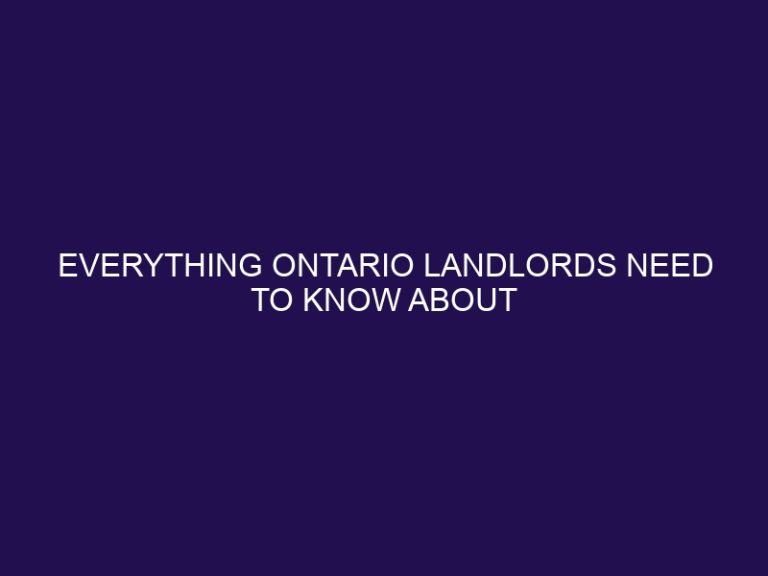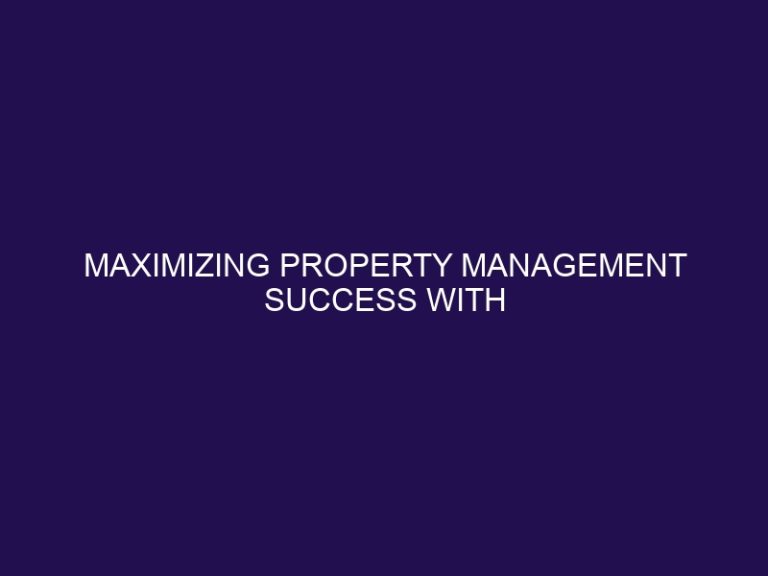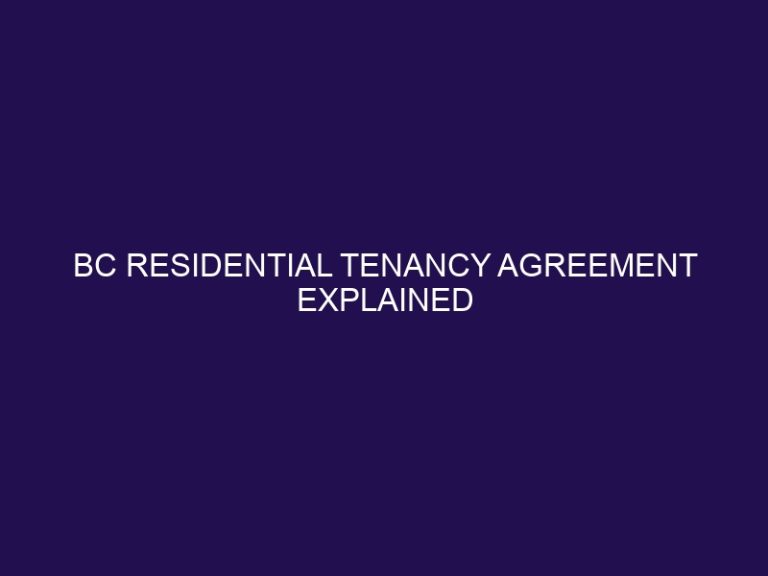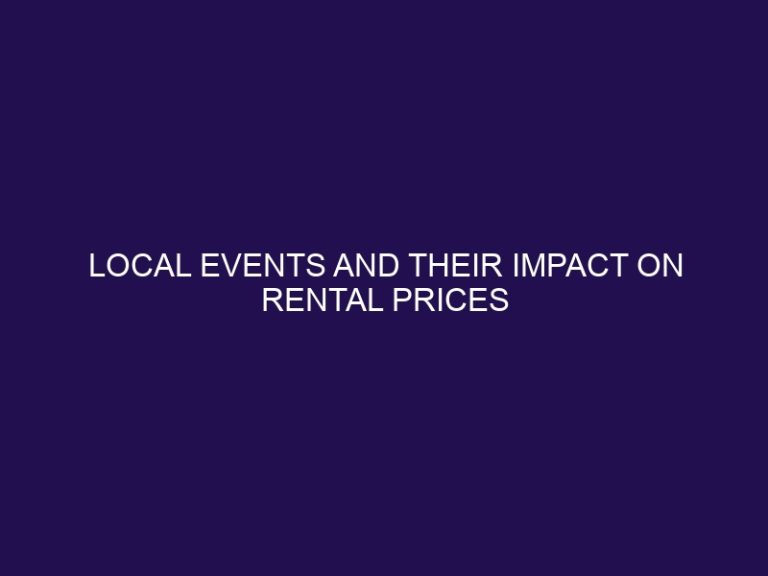First Time Renting Your Property? Here’s What to Know and Do
Renting out your property for the first time can be a daunting and overwhelming experience for many. However, with the right knowledge and steps, it can also be a profitable and rewarding venture.
Property rental refers to the process of leasing your property, whether it is a house, apartment, or commercial space, to a tenant for a specified period, typically in exchange for a monthly rent payment.
So why should you consider renting out your property? The most obvious reason is the potential for extra income. Renting out your property can also provide tax benefits and allows for regular property maintenance. But before jumping into the rental market, here are some steps you should take:
- Determine the rent price based on market rates and your property’s location, size, and amenities.
- Advertise your property through various channels like online listings, social media, and word of mouth.
- Screen potential tenants by conducting background and credit checks.
- Prepare a rental agreement that outlines the terms and conditions of the rental period.
- Collect a security deposit and the first month’s rent before the tenant moves in.
It is essential to understand the legal requirements for renting out your property. These include landlord-tenant laws, fair housing laws, and property insurance requirements.
Managing a rental property also requires effort and responsibility. Regular maintenance and repairs are necessary to keep the property in good condition. Collecting rent and dealing with late payments, handling tenant complaints and issues, and renewing or terminating lease agreements are other crucial tasks.
Renting out your property can be a profitable and fulfilling experience, but it is crucial to understand and follow the necessary steps and legal requirements to ensure a smooth and successful rental experience.
Key Takeaways:
What Is Property Rental?
Property rental is the process of leasing a real estate asset to a tenant in exchange for regular payments. It is a legally binding agreement that outlines the terms, responsibilities, and rights of both parties involved. It is important to have a thorough understanding of rental laws and proper tenant screening when engaging in property rental.
Why Rent Out Your Property?
As a first-time property owner, the idea of renting out your property may seem daunting. However, there are numerous reasons why it can be a beneficial decision. In this section, we will explore the various advantages of renting out your property, including the potential for extra income, tax benefits, and property maintenance. By understanding these benefits, you can make an informed decision on whether renting out your property is the right choice for you.
1. Extra Income
- Make use of property rental as a means of generating extra income by setting competitive rental rates.
- Ensure that the property is well-maintained to attract tenants looking for high-quality rentals.
- Implement online advertising and marketing strategies to reach a larger pool of potential tenants.
2. Tax Benefits
- Deductible Expenses: Take advantage of tax benefits by writing off mortgage interest, property taxes, insurance, maintenance, and repairs.
- Depreciation: Claim a portion of the property’s value each year to receive tax benefits.
- Pass-through Deduction: Qualifying rental income can benefit from a 20% deduction for tax purposes.
A friend once secured significant tax benefits by investing in sustainable upgrades for their rental property, reducing their taxable rental income significantly.
3. Property Maintenance
- Regular maintenance and repairs are crucial for maintaining the value of the property and ensuring tenant satisfaction.
- Conduct regular inspections to promptly address any property maintenance concerns.
- Build a dependable network of maintenance professionals to ensure swift and efficient repairs.
What Are the Steps to Rent Out Your Property?
Are you considering renting out your property for the first time? There are several important steps to take before you can successfully rent out your property. In this section, we will discuss the key steps you need to follow in order to rent out your property. From determining the right rent price to selecting the right tenants, we will cover all the essential information you need to know and do before officially becoming a landlord. Let’s dive in and get you on your way to becoming a successful property owner.
1. Determine the Rent Price
- Research local rental rates for similar properties to determine the appropriate rent price.
- Consider property features, location, and market demand when setting the rent price.
- Factor in maintenance costs, property taxes, and mortgage payments to ensure the rent price is fair and covers these expenses.
- Adjust the rent price based on current market trends and economic conditions to stay competitive.
2. Advertise Your Property
- Take high-quality photos of the property.
- Create an appealing property description highlighting key features and amenities.
- Utilize online platforms and social media to reach a wide audience.
- Consider engaging a real estate agent for broader exposure.
2. Advertise Your Property
3. Screen Potential Tenants
- Review rental applications and conduct background checks.
- Verify employment, income, and rental history.
- Interview potential tenants to assess compatibility and ensure a good fit for the property.
- Check credit reports and references to ensure a reliable and responsible tenant.
After a thorough screening process, I successfully found a tenant who maintained the property impeccably, paid rent punctually, and eventually became a long-term, trustworthy occupant.
4. Prepare the Rental Agreement
When preparing the rental agreement for your property, it’s crucial to familiarize yourself with the legal aspects and include all essential details, such as the rent, security deposit, lease duration, and maintenance responsibilities, to protect both parties involved. Seeking guidance from professionals can also be beneficial in creating a thorough and fair rental agreement.
Some tips to keep in mind when creating a rental agreement include:
- Understand Legalities: Familiarize yourself with the local laws and regulations regarding rental agreements.
- Include Vital Details: Clearly outline the rent, security deposit, lease duration, and maintenance responsibilities.
- Consult Professionals: Seek legal or real estate advice to ensure the agreement is comprehensive.
5. Collect Security Deposit and First Month’s Rent
- In order to safeguard against property damage or unpaid rent, it is customary to request a security deposit of one month’s rent.
- To secure the tenant’s commitment, it is important to collect the first month’s rent before they move in.
What Are the Legal Requirements for Renting Out Your Property?
Renting out your property for the first time can be an overwhelming process, especially when it comes to legal requirements. It is important to understand and comply with these regulations in order to protect yourself and your tenants. In this section, we will discuss the various legal requirements for renting out your property, including landlord-tenant laws, fair housing laws, and property insurance requirements. By the end, you will have a better understanding of your responsibilities as a landlord and how to ensure a successful rental experience.
1. Landlord-Tenant Laws
- Understand the laws regarding landlords and tenants in the local area to ensure compliance.
- Review regulations on security deposits, lease agreements, and eviction procedures to stay informed.
- Stay informed about tenant rights and landlord obligations to maintain a harmonious rental relationship.
2. Fair Housing Laws
- Non-discrimination: Understand and adhere to federal, state, and local laws prohibiting discrimination based on race, color, national origin, religion, sex, familial status, or disability, as outlined in fair housing laws.
- Reasonable accommodations: Provide reasonable accommodations for tenants with disabilities, such as allowing service animals or making necessary modifications, as required by fair housing laws.
3. Property Insurance Requirements
- Assessing Property Insurance Requirements: Determine the necessary coverage for liability, property damage, and loss of rental income.
- Comparing Policies: Obtain quotes from multiple insurers and evaluate their coverage, deductibles, and premiums.
- Reviewing Legal Requirements: Ensure compliance with state-specific insurance regulations and landlord obligations.
Did you know? Property insurance is crucial for landlords to protect against financial losses caused by unforeseen circumstances.
How to Manage Your Rental Property?
Once you’ve decided to rent out your property, it’s important to know how to effectively manage it. This section will cover the key aspects of managing your rental property, including regular maintenance and repairs, collecting rent and dealing with late payments, handling tenant complaints and issues, and renewing or terminating lease agreements. By understanding these essential tasks, you’ll be better equipped to handle the responsibilities of being a landlord.
1. Regular Maintenance and Repairs
- Be sure to regularly inspect the property for any maintenance needs.
- Promptly address any necessary repairs to prevent further damage.
- Keep detailed records of all maintenance and repairs for proper documentation.
Did you know? Neglecting regular maintenance and repairs can result in costly damages in the future.
2. Collecting Rent and Dealing with Late Payments
- Set Clear Payment Terms: Clearly outline the rent amount, due date, late fees, and acceptable payment methods in the lease agreement.
- Send Reminders: Send friendly reminders before the due date to encourage timely payments.
- Implement Late Fees: Clearly state the policies for late fees in the lease agreement and consistently enforce them.
3. Handling Tenant Complaints and Issues
- Listen Actively: When tenants raise concerns, listen attentively to understand the issue.
- Address Promptly: Take swift action to resolve complaints and issues to maintain tenant satisfaction.
- Document: Keep records of all communications and resolutions for future reference in regards to handling tenant complaints and issues.
4. Renewing or Terminating Lease Agreements
- Review Lease Terms: Assess lease expiration date and clauses for renewal or termination.
- Communicate with Tenant: Initiate discussions on renewing or terminating lease agreements well in advance.
- Renewal Process: Provide options and terms for lease renewal, ensuring mutual agreement.
- Termination Procedure: Follow legal requirements and provide formal notice as per lease and local regulations.
Did you know? 4. Renewing or terminating lease agreements requires adherence to lease terms and legal obligations.
Frequently Asked Questions
What are some tips for first-time landlords?
Starting out as a landlord can be a daunting task. It’s important to treat rental property as a business and conduct thorough research on state specific laws. It’s also a good practice to have a network of professionals for any potential problems that may arise.
What are some key things to know about renting out a property?
When renting out a property, it’s important to understand housing laws to avoid potential legal problems. It’s also crucial to present the property in the best light, properly screen tenants, and set clear expectations and boundaries. Maintaining good communication and conducting regular property inspections can also help prevent conflicts.
What is landlord insurance and why is it important?
Landlord insurance is a type of insurance that protects against potential accidents, liability claims, and property damage. It is important for landlords to have this type of insurance to protect their investment and assets.
How can I ensure my rental property stays in good condition?
Maintaining the rental unit and building in good condition is crucial for preventing problems and maintaining a positive reputation. This includes regularly checking and maintaining internal and external pipes, as well as providing necessary safety features such as smoke and carbon monoxide detectors.
What are some tax considerations for rental property owners?
Rental property owners may be subject to various taxes, such as corporate taxes, self-employment tax, and capital gains tax. It is important to consult with a tax advisor to understand the tax perks and potential liabilities for rental investments.
How can I handle unexpected expenses as a landlord?
Being prepared for unexpected expenses, such as pipe bursts or major repairs, can help avoid financial strain. This can include setting aside funds for repairs and maintenance, as well as having a plan in place for handling tenant problems or vacancies.


![What Is The Empty Homes Tax? [Canada]](https://rentincrease.ca/wp-content/uploads/2023/10/what-is-the-empty-homes-tax-canada_2653-768x576.jpg)




